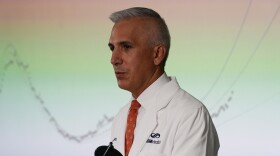Coronavirus Coverage by Sarah Fentem
David Kovaluk
/
St. Louis Public Radio
Sarah Fentem is the health reporter at St. Louis Public Radio.
-
The Centers for Disease Control and Prevention on Wednesday approved the Pfizer COVID-19 vaccine for use in 12- to 15-year-olds. Schools and hospitals already have begun scheduling appointments for parents to take their children to be vaccinated.
-
Daily COVID-19 vaccinations in Missouri have decreased by nearly 65% since reaching their high point in mid-April, and the slowing has doctors skeptical of whether the state can vaccinate enough people to stop the coronavirus from spreading.
-
The county health department has found 212 coronavirus cases among vaccinated people, which shows the shots are "terrifically effective," county health experts said.
-
Hospital leaders from the St. Louis Metropolitan Pandemic Task Force on Monday ended 14 months of weekly livestreamed briefings, citing falling coronavirus cases and hospitalizations of patients with COVID-19. They used the final briefing to encourage residents to receive the COVID-19 vaccine.
-
Under the new law, Missouri counties and towns will only be able to issue orders that restrict access to businesses, churches and schools for 30 days when the governor declares a public health emergency. Without it, they can impose restrictions for 21 days. The law also bars officials from requiring proof of COVID-19 vaccinations to use public facilities and services.
-
Across Missouri, more than 100 schools have spent over $3.5 million — often at taxpayers’ expense — snapping up ionization and other air-purifying devices in an attempt to keep kids safe from COVID-19. But experts warn the largely unregulated technology hasn’t been thoroughly tested in classroom settings and is “often unproven.”
-
For many, the dwindling of the coronavirus pandemic is a chance to reflect on a year of sickness and trauma. For Dr. Alex Garza, St. Louis Metropolitan Pandemic Task Force commander, the last 14 months have offered unexpected lessons about public health. "A lot of the issues aren’t these scientific or medical issues," he said. "I think they’re more cultural and social."
-
Instead of relying on large-scale clinics that distribute thousands of COVID-19 vaccine shots a day as they once did, St. Louis health workers are working with smaller community organizations and clinics to persuade skeptical patients to get the shot.
-
The delta variant was first detected in Missouri in spring and has since spread throughout the state quickly, state health experts said. The variant accounts for about half of the cases involving variants in Missouri and is behind the state's rising case numbers and outbreaks in the southwest part of the state.
-
Missouri is a hot spot for the delta variant, which is easy to catch and transmit, and health officials are urging the state to redouble its efforts to give Missourians the COVID-19 vaccine. Dr. George Turabelidze, Missouri state epidemiologist, said people should assess their risks and whether they should wear masks.











